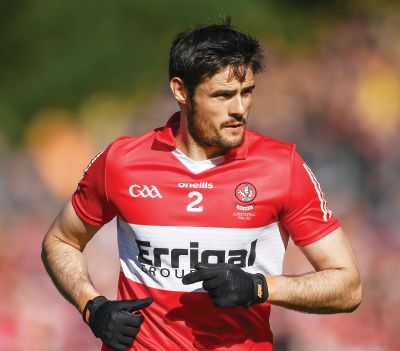MOST teams are now entering into club championships across the province and, as coaches, it’s important we remember that Gaelic football has clearly defined rules.
It is amazing how many of us probably don’t familiarise ourselves with those rules, particularly surrounding contentious issues such as the tackle.
It’s also important to remember that it’s a game in which contact regularly happens – it is one of the most admirable aspects of our game but unfortunately regarding the issue of tackling, it’s the inconsistencies that exist that really frustrate everyone. Some coaches and managers might not be aware of this, but there is an actual definition in the GAA for tackling which reads:
“The Tackle is a skill by which a player may dispossess an opponent or frustrate his objective within the Rules of Fair Play. The tackle is aimed at the ball, not the player. The tackler may use his body to confront the opponent but deliberate bodily contact (such as punching, slapping, arm holding, pushing, tripping, jersey pulling or a full frontal charge) is forbidden. The only deliberate physical contact can be a Fair Charge i.e. shoulder-to-shoulder with at least one foot on the ground. More than one player can tackle the player in possession.”
Reading the above definition does leave the whole debate of what is a legitimate tackle very open and one person’s interpretation of a legitimate tackle could be very different to another person’s. For a referee to have to make an instant decision in real time is obviously very difficult and we must share some sympathy for those in the middle with the whistle because it’s becoming an increasingly difficult job.
One thing is for certain, I personally disagree with the view from some people that the tackle can’t be coached.
Coaches can coach the tackle within their training sessions but problems occur when coaches “let things go” in training and subsequently these bad habits are carried into a game.
This is why when coaching the tackle in training it is imperative that any clear fouls, which according to the above definition include punching, slapping, pulling, tripping or frontal charging, are punished. Explain to the players clearly where they are going wrong otherwise players will feel ‘this is fine’. This is where your skill in spotting and fixing as a coach comes into the equation.
Another great way to help players improve their tackling is to show some images or videos of good tackling and also equally as important to show some tackles that have been punished so players and particularly young players have a clear image in their head of what constitutes a legitimate tackle and what is not.
There is no doubt that tackling is a skill, and if you can coach the proper technique to your players it will give them the belief and confidence to execute the skill of tackling effectively during a game. When it comes to coaching the tackle, consider the following 4 Ds:
Delay – Try to slow the player in possession down and break their momentum force them to alter their feet or body which in turn will help you execute the tackle more efficiently.
Deny – suffocate the space of the player on the ball; invade his personal space ultimately denying him sufficient room to manoeuvre.
Dispossess – legally try to strip the ball from your opponent, wait for the player to make a play, i.e. solo or a bounce, then pounce with quick hands and eyes on the ball.
Develop – One of the most undercoached aspects of the tackle is what happens after you actually win the ball back.
You must think transitions, defence immediately to attack and when you are facilitating tackling exercises in training create a situation where the tackler if he wins the ball, must develop the play.
Receive quality journalism wherever you are, on any device. Keep up to date from the comfort of your own home with a digital subscription.
Any time | Any place | Anywhere












